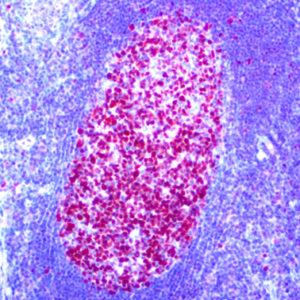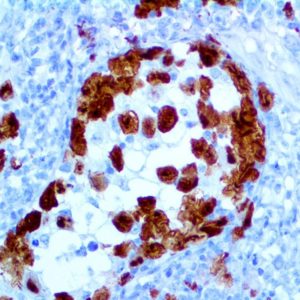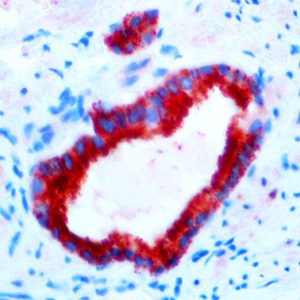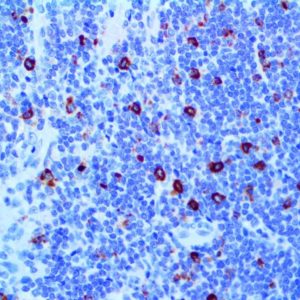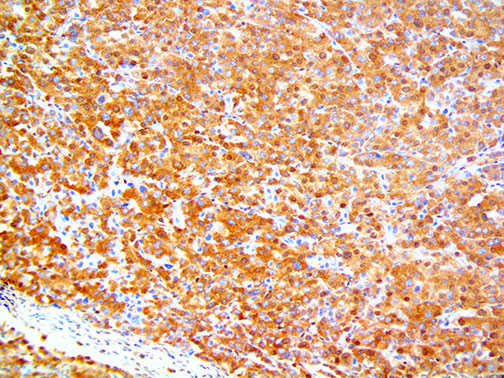
IHC of SMAD4 on a FFPE Pancreatic Cancer Tissue
| Intended Use | For In Vitro Diagnostic Use | |||||||||||||||||||||||||||||||||||
| Summary and Explanation | SMAD 4, also known as DPC4 or SMAD family member n°4, is a protein involved in cell signaling in mammals. SMAD 4 forms with SMAD 3 a complex which can bind to DNA and modify the expression of several genes related to cellular activities such as proliferation or differentiation. SMAD 4 serves as a mediator between extracellular growth factors from the TGFβ family and genes inside the cell nucleus. The abbreviation coin co-SMAD stands for common mediator. SMAD 4 is also defined as a signal transducer. SMAD4, is often found mutated in many cancers. The mutation can be inherited or acquired during an individual’s lifetime. If inherited, the mutation affects both somatic and sexual cells. If the SMAD 4 mutation is acquired, it will only exist in certain somatic cells. Indeed, SMAD 4 is not synthesized by all cells. The protein is present in skin, pancreatic, colon, uterus and epithelial cells. It is also produced by fibroblasts. The functional SMAD 4 participates in the regulation of the TGF-β signal transduction pathway, which negatively regulates growth of epithelial cells and the extracellular matrix (ECM). When the structure of SMAD 4 is altered, expression of the genes involved in cell growth is no longer regulated and cell proliferation can go on without any inhibition. The important number of cell divisions leads to the forming of tumors and then to multiploid colorectal cancer and pancreatic carcinoma. It is found inactivated in at least 50% of pancreatic cancers. SMAD 4 is also found mutated in the autosomal dominant disease juvenile polyposis syndrome (JPS). JPS is characterized by hamartomatous polyps in the gastrointestinal (GI) tract. These polyps are usually benign, however they are at greater risk of developing gastrointestinal cancers, in particular colon cancer. Approximately 55% of pancreatic cancers bear deletions or mutations in SMAD4/DPC4 . Patients undergoing surgical resection of their pancreatic adenocarcinoma, survival of patients whose tumors expressed SMAD4 protein was significantly longer (unadjusted median survival, 19.2 months) as compared with 14.7 months without SMAD4 protein expression (P = 0.03). This SMAD4 survival benefit persisted after adjustment for prognostic factors including tumor size, margin status, lymph node status, pathological stage, blood loss, and use of adjuvant chemoradiotherapy. | |||||||||||||||||||||||||||||||||||
| Antibody Type | Rabbit Monoclonal | Clone | RBT-SMAD4 | |||||||||||||||||||||||||||||||||
| Isotype | IgG | Reactivity | Paraffin, Frozen | |||||||||||||||||||||||||||||||||
| Localization | Nuclear, Cytoplasmic | Control | Pancreas, Testis, Breast, Bone Marrow, Colon | |||||||||||||||||||||||||||||||||
| Presentation | SMAD4 is a rabbit monoclonal antibody derived from cell culture supernatant that is concentrated, dialyzed, filter sterilized and diluted in buffer pH 7.5, containing BSA and sodium azide as a preservative. | |||||||||||||||||||||||||||||||||||
| Availability |
| |||||||||||||||||||||||||||||||||||
| Note: For concentrated antibodies, please centrifuge prior to use to ensure recovery of all product. | ||||||||||||||||||||||||||||||||||||
